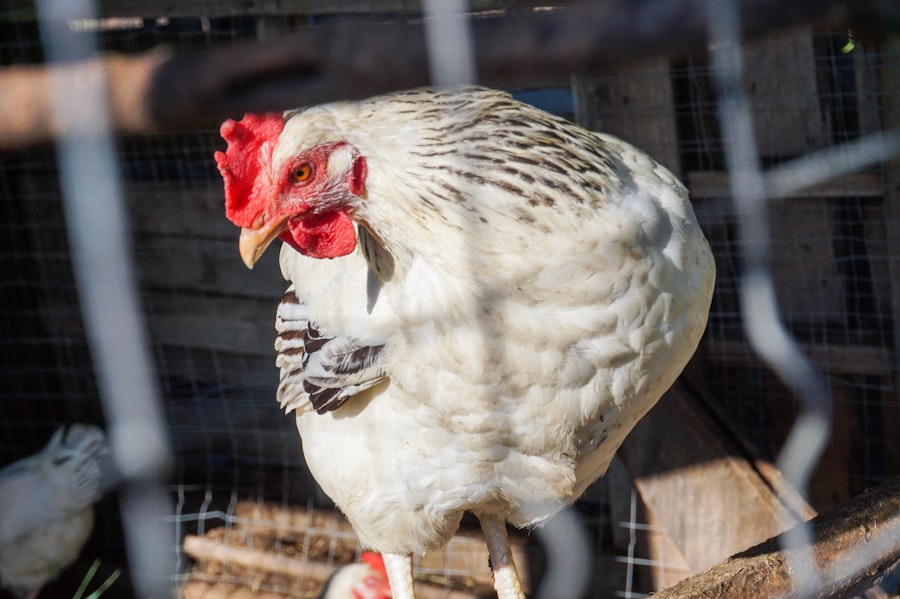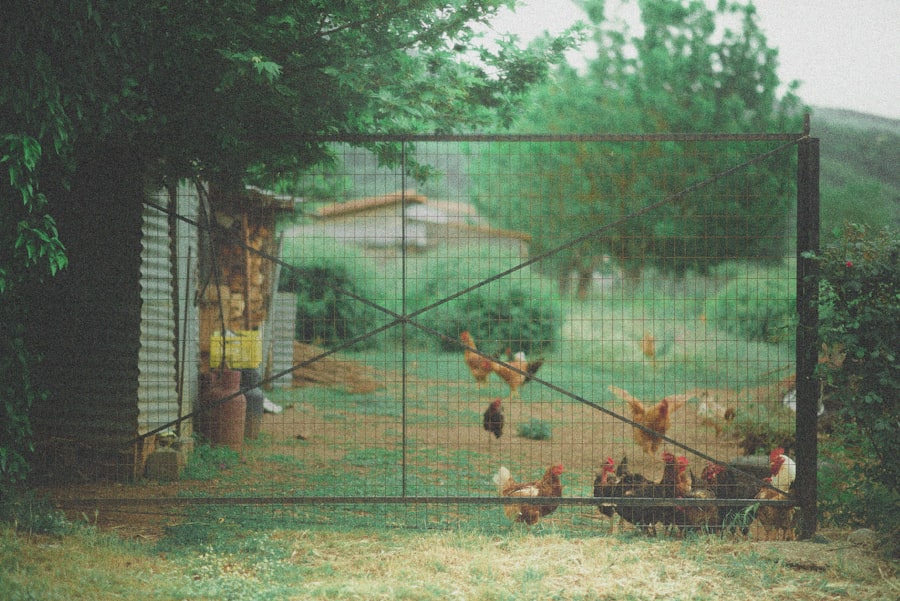Keeping chickens can be a rewarding and enjoyable experience for people of all ages. Whether you live in a rural area or a suburban neighborhood, raising chickens can provide you with fresh eggs, natural pest control, and a connection to nature. Chickens are relatively low-maintenance animals and can be a great addition to any household.
Before you embark on your chicken-keeping journey, it’s important to familiarize yourself with the basics of chicken care and understand the commitment involved in raising these feathered friends. Chickens come in a variety of breeds, each with its own unique characteristics and egg-laying capabilities. Some breeds are known for their docile nature and excellent egg production, while others are prized for their ornamental plumage and distinctive personalities.
When choosing a breed, consider factors such as climate, space availability, and your specific needs and preferences. Additionally, it’s important to check local regulations and zoning laws to ensure that keeping chickens is permitted in your area. Once you’ve selected the right breed and obtained any necessary permits, you can begin the process of setting up a coop and run for your new flock.
Table of Contents
- 1 Setting Up a Coop and Run
- 2 Feeding and Watering Chickens
- 3 Egg Collection and Care
- 4 Cleaning and Maintaining the Coop
- 5 Health and Wellness Checks
- 6 Daily Interaction and Enrichment
- 7 FAQs
- 7.1 What is a daily routine for keeping chickens?
- 7.2 What should be included in the daily feeding of chickens?
- 7.3 How often should the chicken coop be cleaned?
- 7.4 What should be checked for during the daily health check of chickens?
- 7.5 What is the best way to collect eggs from chickens?
- 7.6 How can I keep my chickens safe from predators?
Key Takeaways
- Keeping chickens can be a rewarding and enjoyable experience for both beginners and experienced poultry keepers.
- Setting up a coop and run requires careful consideration of space, ventilation, and predator protection.
- Feeding and watering chickens involves providing a balanced diet and ensuring access to clean water at all times.
- Egg collection and care involves checking for and removing any dirty or cracked eggs, and storing them properly.
- Cleaning and maintaining the coop is essential for the health and well-being of the chickens, and should be done regularly to prevent disease and pests.
Setting Up a Coop and Run
Designing the Coop
When designing a coop, consider factors such as ventilation, insulation, and predator-proofing. The coop should be spacious enough to accommodate your flock, with at least 2-3 square feet of space per chicken. It’s also important to provide nesting boxes for egg-laying and roosting bars for chickens to perch on at night.
Creating the Run
In addition to the coop, a secure run is necessary to give chickens access to fresh air and outdoor space. The run should be enclosed with wire mesh to prevent predators from entering and should include areas for dust bathing and scratching. Providing enrichment such as perches, branches, and hanging toys can help keep chickens active and engaged.
Final Touches
When setting up the coop and run, consider the layout of your property and the proximity to your home for easy access and monitoring. Once the coop and run are in place, it’s time to focus on providing your chickens with proper nutrition and hydration.
Feeding and Watering Chickens

Proper nutrition is essential for the health and productivity of your flock. A balanced diet for chickens typically consists of a commercial feed that is formulated to meet their nutritional needs. This feed can come in the form of pellets, crumbles, or mash, and should contain a mix of protein, carbohydrates, vitamins, and minerals.
In addition to commercial feed, chickens can also benefit from supplemental treats such as fruits, vegetables, mealworms, and kitchen scraps. It’s important to provide access to clean water at all times, as chickens can quickly become dehydrated. When feeding your chickens, consider factors such as age, breed, and egg-laying status.
Chicks require a different diet than adult chickens, and laying hens may benefit from a higher calcium content to support egg production. It’s also important to monitor food consumption and adjust portion sizes as needed to prevent overeating or waste. Additionally, providing access to grit and oyster shells can help chickens with digestion and eggshell formation.
By ensuring that your flock has access to a balanced diet and clean water, you can help promote their overall health and well-being.
Egg Collection and Care
One of the most rewarding aspects of keeping chickens is collecting fresh eggs from your flock. Depending on the breed, age, and environmental conditions, chickens can lay eggs daily or several times a week. It’s important to establish a routine for collecting eggs to ensure that they are gathered promptly and handled properly.
When collecting eggs, check for any signs of damage or soiling, and discard any eggs that are cracked or dirty. It’s also important to store eggs in a cool, dry place to maintain their freshness. In addition to collecting eggs, it’s important to care for them properly to ensure their quality and safety.
Eggs should be cleaned if necessary using a dry cloth or brush to remove any dirt or debris, but should not be washed with water as this can remove the protective bloom that helps seal the eggshell. Proper storage is also important to maintain egg quality, with eggs being best stored in the refrigerator at a consistent temperature. By following these guidelines for egg collection and care, you can enjoy fresh, delicious eggs from your flock while promoting food safety and hygiene.
Cleaning and Maintaining the Coop
Maintaining a clean and sanitary living environment is essential for the health and well-being of your chickens. Regular cleaning of the coop helps prevent the buildup of waste, bacteria, and parasites that can lead to disease and discomfort for your flock. When cleaning the coop, start by removing all bedding material from the floor and nesting boxes.
Use a shovel or rake to scrape away any accumulated droppings or debris, then thoroughly sweep or hose down the interior surfaces. After cleaning the coop, it’s important to replace the bedding material with fresh straw, shavings, or other suitable materials. This helps absorb moisture and odors while providing a comfortable resting area for your chickens.
Additionally, consider using natural pest control methods such as diatomaceous earth or herbs to deter insects and parasites. Regularly inspecting the coop for signs of wear or damage can help prevent potential issues such as leaks or drafts. By maintaining a clean and well-ventilated coop, you can help create a healthy living environment for your flock.
Health and Wellness Checks

Conducting Health Checks
When conducting health checks, observe your chickens for any changes in behavior, appetite, or appearance. Look for signs of lethargy, abnormal droppings, respiratory issues, or unusual lumps or injuries. Additionally, check for signs of parasites such as mites or lice on the skin or feathers.
Hands-On Inspections
In addition to visual inspections, it’s important to handle your chickens regularly to check for any abnormalities such as bumblefoot or vent issues.
Professional Guidance and Prevention
Establishing a relationship with a poultry veterinarian can provide valuable guidance and support for maintaining the health of your flock. It’s also important to stay up-to-date on vaccinations and parasite prevention measures recommended for chickens in your area. By staying vigilant and proactive about the health of your flock, you can help ensure that they lead happy and healthy lives.
Daily Interaction and Enrichment
Chickens are social animals that benefit from daily interaction and enrichment activities. Spending time with your flock not only strengthens the bond between you and your chickens but also provides mental stimulation and entertainment for them. Consider spending time in the coop or run with your chickens each day, observing their behavior and providing gentle interaction such as petting or talking to them.
Additionally, providing enrichment activities such as hanging treats or toys can help keep chickens engaged and active. In addition to human interaction, chickens benefit from opportunities for natural behaviors such as scratching, dust bathing, and foraging for insects or vegetation. Providing access to a varied outdoor environment with different textures and materials can help stimulate these natural behaviors.
Additionally, consider introducing new elements such as perches or platforms for chickens to explore and interact with. By providing daily interaction and enrichment opportunities for your flock, you can help promote their overall well-being while enjoying the unique personalities of each chicken. In conclusion, keeping chickens can be a fulfilling experience that provides numerous benefits for both you and your feathered friends.
By understanding the basics of chicken care, setting up a safe living environment, providing proper nutrition and hydration, collecting eggs with care, maintaining a clean coop, monitoring health and wellness, and providing daily interaction and enrichment activities, you can create a happy and healthy environment for your flock. Whether you’re new to chicken-keeping or have years of experience, there’s always something new to learn about these fascinating creatures. With dedication and attention to their needs, you can enjoy the many joys that come with raising chickens as part of your household or homestead.
If you’re looking to improve your daily routine for keeping chickens, you might want to check out this article on 10 essential tips for building a chicken coop. It provides valuable insights on how to create a comfortable and safe environment for your feathered friends, which is crucial for their well-being and productivity.
FAQs
What is a daily routine for keeping chickens?
A daily routine for keeping chickens involves tasks such as feeding, watering, egg collection, cleaning the coop, and checking for any signs of illness or injury.
What should be included in the daily feeding of chickens?
Chickens should be fed a balanced diet of commercial chicken feed, supplemented with fresh fruits, vegetables, and grains. It’s important to provide access to clean water at all times.
How often should the chicken coop be cleaned?
The chicken coop should be cleaned on a daily basis to remove droppings and soiled bedding. A thorough cleaning and disinfection should be done on a weekly basis.
What should be checked for during the daily health check of chickens?
During the daily health check, chickens should be observed for any signs of illness or injury, such as lethargy, abnormal droppings, or changes in behavior. It’s also important to check for parasites such as mites or lice.
What is the best way to collect eggs from chickens?
Eggs should be collected from the nesting boxes daily to ensure they are clean and to prevent hens from becoming broody. It’s important to handle the eggs carefully to avoid breakage.
How can I keep my chickens safe from predators?
To keep chickens safe from predators, it’s important to secure the coop with sturdy fencing and locks, and to provide a safe and secure roosting area at night. Additionally, it’s important to be vigilant and aware of potential threats in the surrounding area.
Meet Walter, the feathered-friend fanatic of Florida! Nestled in the sunshine state, Walter struts through life with his feathered companions, clucking his way to happiness. With a coop that’s fancier than a five-star hotel, he’s the Don Juan of the chicken world. When he’s not teaching his hens to do the cha-cha, you’ll find him in a heated debate with his prized rooster, Sir Clucks-a-Lot. Walter’s poultry passion is no yolk; he’s the sunny-side-up guy you never knew you needed in your flock of friends!







